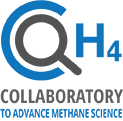Science-based Collaboratory Brings Diverse Stakeholders Together to Study Methane Emissions from Natural Gas
6/25/18 Des Plaines, IL
A new industry-led collaborative research consortium will work to advance methane science to better understand global methane emissions and the need for additional solutions.
The Collaboratory for Advancing Methane Science (CAMS) will pursue scientific studies addressing methane emissions from all sectors along the entire natural gas value chain, from production to end use. Studies will focus on detection, measurement, and quantification of methane emissions with the goal of finding opportunities for reduction.
GTI will serve as the program administrator for the effort with initial participants from leading energy companies Cheniere, Chevron, Equinor, ExxonMobil, and Pioneer Natural Resources, and plans to expand participation to include other companies from across the natural gas value chain. Through scientific studies, CAMS will bring together a diverse group of experts from industry, academia, and federal and state agencies to deliver factual data that can be used to inform regulations and policy development.
GTI will manage the overall program, including individual research projects. CAMS members, with input from an independent Scientific Advisory Board, will prioritize and fund research. CAMS will focus on effectively communicating findings to program stakeholders and the general public. Results will be independently published by the research project team in peer-reviewed scientific journals.
“This is an important collaboration between industry, academia, government, and researchers,” said Amol Phadke, vice president, safety and sustainability for U.S. and Mexico operations, Equinor. “It is a great opportunity to work together in understanding emissions across the value chain, giving us a more complete picture of how we can continue to reduce methane from our operations.”
“As a leading energy company, we are committed to continually reducing methane emissions,” said Sara Ortwein, president of XTO Energy, a subsidiary of ExxonMobil. “The right partnerships are critical for success, and participating in CAMS will expand industry learning on solutions that can make a difference.”
“The use of natural gas is already reducing carbon dioxide and traditional air pollutants in the United States and around the world, but further reduction of methane emissions greater amplifies the positive impact of natural gas,” said Chris Smith, SVP for Policy, Government and Public Affairs at Cheniere, the largest U.S. exporter of LNG. “Supporting peer-reviewed science is an important first step as we look for ways to encourage the reduction of methane emissions throughout the domestic natural gas value chain.”
The research will complement recent methane emissions studies sponsored by government agencies and academia, and build on lessons learned from that body of work. New tools and technologies to better detect leaks and characterize emissions will be evaluated, and practical solutions for emissions reduction will be identified.
About the Collaboratory to Advance Methane Science
CAMS is an industry-led collaborative research consortium working to advance methane science to better understand global methane emissions and the need for additional solutions. CAMS will pursue scientific studies addressing methane emissions from all sectors along the entire natural gas value chain, from production to end use, in basins across the country. Studies will focus on detection, measurement and quantification of methane emissions with the goal of finding opportunities for reduction.
About GTI
GTI is a leading research, development and training organization that has been addressing global energy and environmental challenges by developing technology-based solutions for consumers, industry, and government for more than 75 years.

